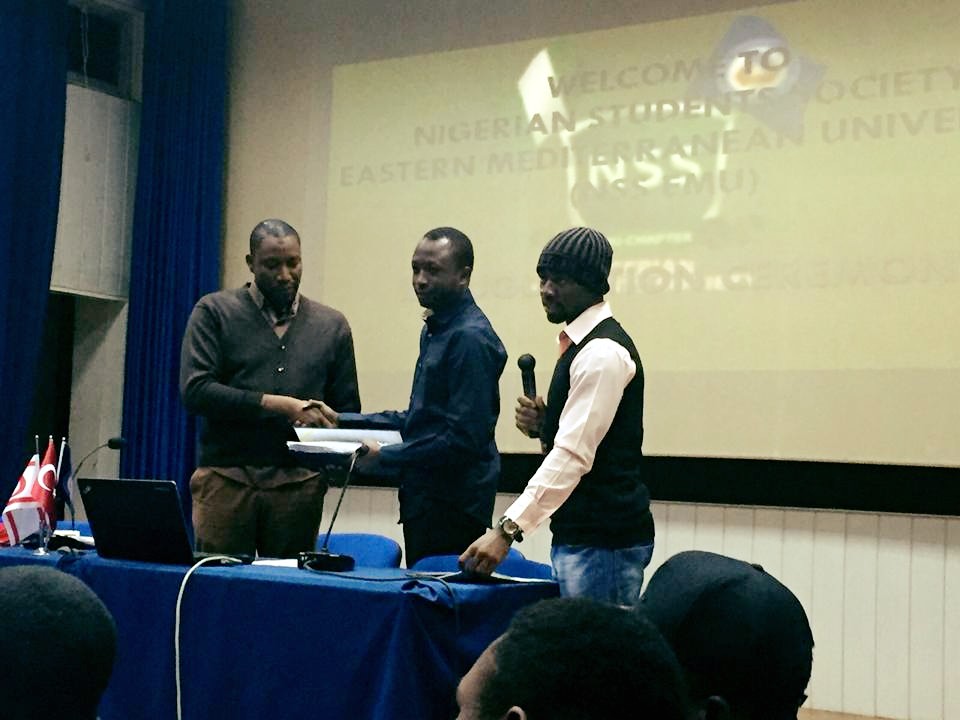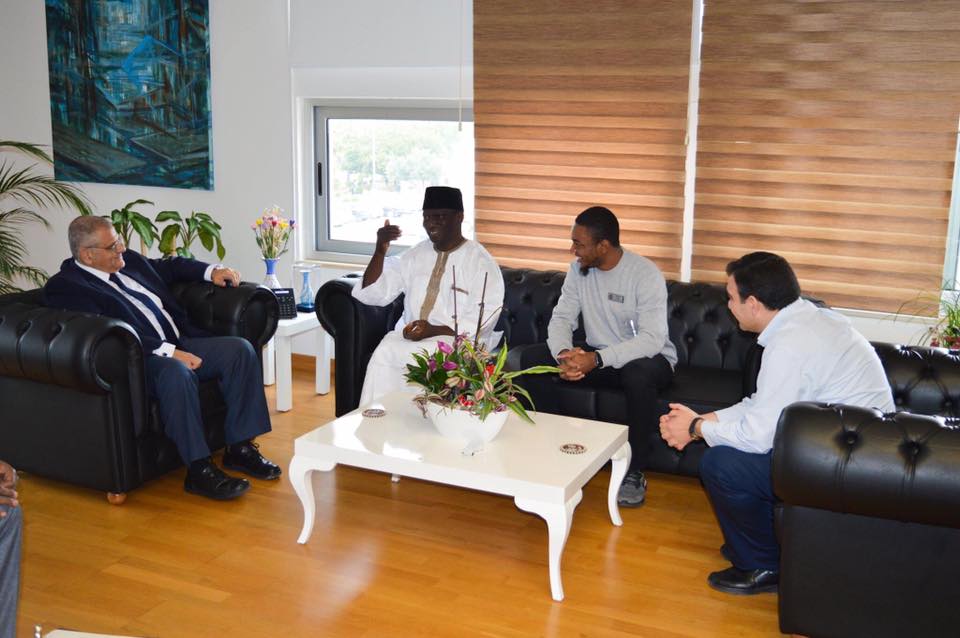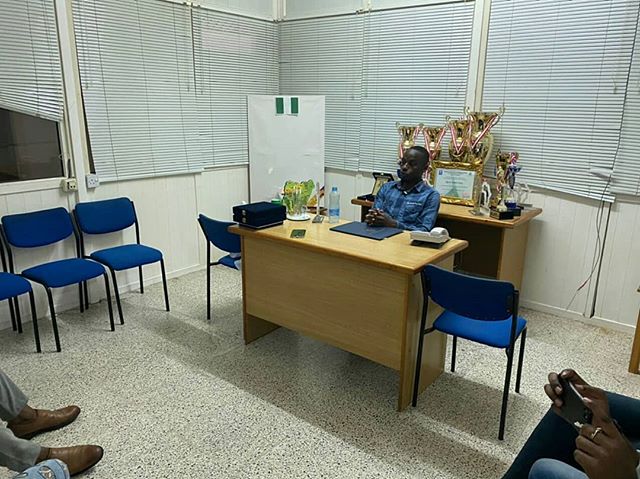The president of the NSS EMU (POTNSS-EMU) is the head of the society/association of Nigerian Students in EMU. The president directs the Executive Organ of the NSS.
At different times, the president is looked upon as one of the universities' most powerful student political figures as the leader of the largest participating student society in the university.
The Constitution of the NSS establishes the executive branch. It vests the executive power of the NSS in the president. The power includes the execution and enforcement of Bills, alongside the responsibility of appointing Cabinet Members, Senate Members, and Legal Representatives. The president represents the people of the NSS EMU and takes an active role in promoting his or her policy priorities to members of the Senate and The School Authority. In addition, as part of the system of checks and balances, the Constitution gives the president the power to sign or veto bills or decisions. The power of the presidency has grown substantially since its formation, as has the power of the NSS as a whole
Through the Annual Elections held by the International Office, registered Nigerian students vote directly the president and the vice president to a single-year term. Two vice president's has become president by virtue of a president's resignation and removal from office.
The School and the Constitution set qualifications for holding the presidency: Citizenship; a CGPA of not less than 2.50; and no Criminal Record. The Constitution states that no person who has been elected to two presidential terms may be elected to a third. In all, 14 individuals have served 15 presidencies spanning 14 full one-year terms. Ibrahim Saghir served two non-consecutive terms, so he is counted twice, as both the 13th and 15th president and also would be counted as the longest serving president of the NSS (2018,2019-2021) as well as the fisrt president to step down fromoffice officially.
Izu Nwamara is the 16th and incumbent president of the Nigerian Students Society of Eastern Meditteranean University North Cyprus. He assumed office on October 12, 2021 at 12.00 noon GMT+3.
Origin.
The existence of the association dates as far back as 2006, Baba Zakari was unanimously elected as the Pioneer President of the then Nigerian Students Association EMU defined the structure of the Nigerian Students Association, also referred ideas to solve problems of discrimination against Nigerian and African Students. With his team, fought for the rights of Nigerian students and African students in EMU in general.
Powers and duties
In Accordance with the Constitution, as written by the Senate in 2015, THE PRESIDENT shall
(i) Be the Chief Executive, representative, and spokesman of NSS
(ii) Co-ordinate and harmonize effectively the activities of NSS and participate when
necessary in the activities of other student societies and other international
societies
(iii) Through the secretary-general summon meetings of the office and executive
council
(iv) Preside over all meetings and shall only have a casting vote when there is a tie
(v) Be the overall custodian of NSS properties
(vi) Be a co-signatory to all accounts of NSS
(vii) Have the power to approve or reject vouchers raised by any NSS officials where
in the latter case, the voucher is deemed questionable or unnecessary.
(viii) Delegate members of the executive council or any NSS official some functions
and he shall ultimately be held responsible and accountable for the discharge of
such delegated functions
Selection process
Eligibility
As Stipulated in the NSS Constitution:
i.Must have a CGPA of at least 2.50 and above
ii.Must satisfy the school electoral laws established by the international
office
iii.Must be a fully registered student of EMU
iv.Must be a Nigerian
v.Must not have committed an offense or found guilty by the University
‘s disciplinary committee
Campaigns, nomination, and Elections
Campaigns start officially after the International Office has released an official list of qualified candidates that applied for the position, debates are usually held between candidate to voice their policies and plans and Elections set by the University by the International Office usually holds in Late October/November gives Nigerian Students the opportunity to directly elect the President, typically the Vice Presidential Nominee selected by the President before the elections subsequently becomes Vice President. For a candidate to win, he/she must win the absolute majority of votes or a majority of "yes" votes where there is just a single candidate as seen in the Elections of 2018 where Victor Ika secured victory with 68-60 votes.
Tenure
Pursuant to the Updated Constitution of 2020, the one year term of a President and Vice President begins at noon on December 5. The first presidential terms to begin on this date would be December 5, 2020. Although due to a standing tradition that has preceded administrations, an Elected President is referred to as President-Elect if the organized Handover Ceremony hasn't held, in a case where the Handover dinner holds before the Annual Nigerian Night the Elected President is referred to as President-Designate (Incoming President) already in partial powers alongside the sitting President or better known as a lame-duck president until the events have been held.
Before Executing the powers of office, a President is required to recite the oath of office:
" I _______ do solemnly swear (or affirm) that I will faithfully execute the Office of President of the Nigerian Students Society EMU, and will to the best of my ability, preserve, protect, and defend the Constitution of the NSS. So help me God"
Term limit
When the first President Baba Zakari gave a farewell speech after his one year term it gave a precedent for almost 8 years for Future Presidents to serve for one-year and not seek re-elections until 2014 when Samuel Omale sought re-election but was unsuccessful, Ibrahim Saghir would be the first to serve in two non-consecutive terms (technically having his first term in 2019)
But with the new Constitution of adaption of 2020, it would put term limits on the office of President

Baba Zakari, the first President of the Nigerian Students Society EMU.

9th President Salim Hamza and 10th President Madaka Farouq exchange handshakes at NSS Inauguration Ceremony.

Ibrahim Saghir, the 13th and 15th President of the NSS.

(L-R) Former EMU Rector Necdet, Guest Minister from Nigeria, 14th President of the NSS Victor Ika and Vice Rector Cem Tanova.
Impeachment
In accordance with the Constitution, The senate shall have the power to SUSPEND or IMPEACH any official
of NSS found guilty of negligence of duty, embezzlements or any forms of
Misappropriation of funds or abuse of office, an impeachment proceeding can pass on a minimum of 13-7 votes in the Senate then a minimum of 11-9 votes for Removal from office (this only applies to the Office of President, Vice President & Senate President). The accused officer shall be
free to appeal to the International office. Also, the School authority maintains the right to SUSPEND or IMPEACH and REMOVE the President the of NSS found guilty of negligence of duty, embezzlements, or any forms of Misappropriation of funds or abuse of office.
Only one President has been impeached and removed from office by the School Authority: NI Emeka in 2018. Impeachment attempts by the Senates have occurred twice Samuel Omale (2014) and Jerry Sambe (2017) but we're failed attempts.
Succession and disability
Vacancies and succession in the office of the president may arise under several possible circumstances: resignation, and removal from office. Removal from office has occurred only once.
The Constitution stipulates that the vice president takes over the "powers and duties" of the presidency in the event of a president's removal, resignation, or inability. The vice president becomes president upon the removal from office or resignation of the president. The president may transfer the presidential powers and duties to the vice president, who then becomes acting president, by transmitting a statement to the Senate President stating the reasons for the transfer. The president resumes the discharge of the presidential powers and duties upon transmitting, to the Senate President, a written declaration stating that resumption. Such a transfer of power has occurred once: Madaka Farouk to Temitope Ajiboro.
The Constitution also gives the ability to the Senate to declare who shall become acting president in the "Case of Removal, Resignation or Inability, both of the president and vice president". The NSS Succession provides that if both the president and vice president have left office or are both otherwise unavailable to serve during their terms of office, the presidential line of succession follows the order of Senate President, then, if necessary, the eligible heads of the Executive Departments who form the president's cabinet. The cabinet currently has 15 members, of which the secretary-general is first in line; the other Cabinet Directors follow in the order in which their department (or the department of which their department is the successor) was created. Those department heads who are constitutionally ineligible to be elected to the presidency are also disqualified from assuming the powers and duties of the presidency through succession. No statutory successor has yet been called upon to act as president.
Office
BEA 169 is the official office of the president. The office was selected by Samuel Omale in 2014, . Every president since Samuel Omale (in 2014) has occupied the Office there. The Office is situated in the Business and Economics Department of EMU, The office also serves as the NSS Office.

Former President Ibrahim Saghir at the NSS Office.